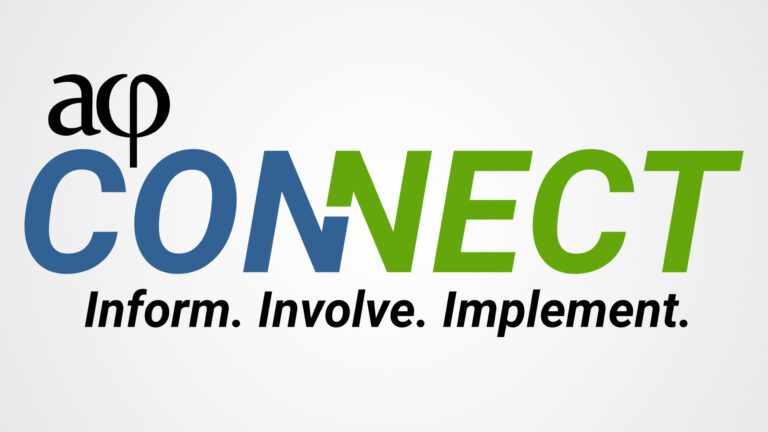
Before the pandemic arrived, ACP Connect events provided an opportunity for ACP Council and staff to meet “in-person” with pharmacists and pharmacy technicians to discuss initiatives being introduced by the college and current issues in pharmacy practice. On December 2 and 3, 2020, COVID-19 forced ACP Connect to move online for three virtual sessions.
The theme: COVID-19.
ACP registrants were invited to join ACP Council president Dana Lyons and registrar Greg Eberhart for a virtual discussion about what we have all learned through our experiences so far during the pandemic.
Approximately 400 registrants in total joined the sessions. To kick off the events, Greg shared details about what the college has done in response to the pandemic, including development of new guidelines, virtual Council meetings and hearings, and hybrid inspections of pharmacies. Attendees were asked to consider what they have done to meet their patients’ needs, what has and hasn’t worked, and what initiatives should continue post pandemic.
Dana was impressed with how eager registrants were to share their experiences with one another and reflect on the possibilities that lay ahead as we gain experience working in new ways.
“The conversations were rich with an exchange of ideas including new workflow procedures some pharmacies have put in place,” said Dana. “Registrants from all over the province were able to find out how other community pharmacies were coping and how they were handling the heavy workload and stress.”
In the online chat, the following trends were identified:
- increased demand for prescription delivery and virtual services;
- an increase in the number of electronically transmitted prescriptions, either by fax, phone, or e-prescribing (where available);
- an increase in prescribing activities, where patients did not have access to their physician or other primary care provider; and
- a noticeable increase in the number of patients requiring support with mental health concerns.
Other themes from the discussion
Many patients are putting more value into the care they receive from their pharmacy teams. Albertans have noticed that pharmacists and pharmacy technicians are more accessible at a time when other health professionals were not taking appointments or making themselves available, and have appreciated the services being provided.
Some pharmacy teams are now offering appointments for care, rather than drop-in services, especially for providing flu shots. User-friendly online booking tools have made the process easy. Requiring pre-booked appointments allowed pharmacies to avoid crowding at potentially busy times.
There have also been some negative impacts on pharmacy teams. Many participants talked about long hours and heavy workloads as the demand for pharmacy services in general has increased.
Anxiety levels have grown. Many expressed that they worry not only about being exposed to COVID-19 themselves, but also exposing their family members. What was compelling, is the resilience demonstrated by pharmacy teams, and how individuals have pulled together to support one and other personally and professionally.
Some pharmacies have split their staff into two distinct teams, so that if any team member tests positive for COVID-19 or is forced to self-isolate, it only affects half of the pharmacy staff. This has proven to be an effective strategy in pharmacies with enough staff to support two teams.
Pharmacy technicians are stepping up, working to their full scope, and allowing pharmacists to concentrate on their clinical responsibilities. The contributions of pharmacy technicians during the pandemic have included managing the pharmacy workflow, pre-screening patients, ensuring compounding and other work areas are properly cleaned, performing final checks on prescriptions, and completing best possible medication histories with patients.
There was a common message that ACP should find ways to extend virtual care and authorities accommodated through the s56 exemption to the Controlled Drugs and Substances Act beyond the COVID-19 time period. These have proven beneficial to patients and successes in practice.
What have pharmacy professionals learned about themselves through the pandemic? For one, that they can adapt to meet the needs of their patients. Pharmacy teams have learned to exercise patience with each other and with their patients, and to show compassion, empathy, and kindness during these stressful times.
Overall, we had tremendous engagement from registrants in all three sessions of ACP Connect. We hope that we can all learn from the experiences that were shared and apply what we’ve learned beyond COVID.
More ACP Connect virtual sessions are planned for early 2021. Watch for the invitations in your mailbox this spring.




